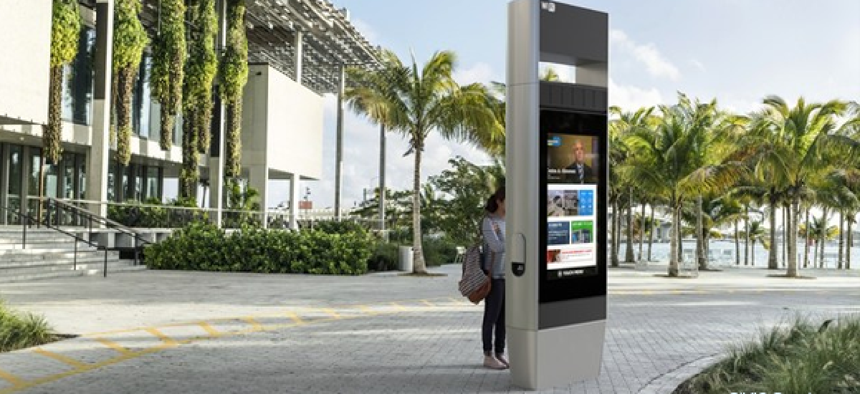County rolls out smart kiosks, transit Wi-Fi


Connecting state and local government leaders
The digital kiosks and Wi-Fi on public transportation will help Miami-Dade County relieve traffic congestion and build a smart city infrastructure.
Miami-Dade County thinks free Wi-Fi on public transit could help it relieve traffic congestion.
Alice Bravo, the director of transportation and public works for Miami-Dade, said the county hopes to encourage more people to take public transit by installing Wi-Fi on buses and trains and at transit stops, Bravo told GCN.
The county is working on the project with CIVIQ Smartscapes, a developer of smart city infrastructure such as the LinkNYC network that replaced city’s payphones in New York City with kiosks that provide free high-speed Wi-Fi, phone calls, USB charging, maps, and direct access to 911 and 311.
The first phase will roll out over next three months and will include 300 interactive digital kiosks called WayPoints, which will provide free public Wi-Fi. Over 1,000 Wi-Fi devices will be installed in public transit vehicles, and 51 additional Wi-Fi devices in transit stations, according to CIVIQ.
The WayPoints will provide travelers with transit schedules, information on local businesses, alerts and other information, Bravo said. The Wi-Fi on buses and trains will also improve real time updates of vehicle location, she added.
The company’s goal is to deliver the best “citizen mobility experience” by providing people-centered, state-of-the-art access to city services. The partnership increases interconnectivity between different Miami-Dade public services -- transportation, public works, public safety, and more, CIVIQ officials said.
“This is one of the single largest tech upgrades, providing real-time benefits to residents of Miami-Dade I’ve seen in my years here,” Miami-Dade CIO Angel Petisco said in a statement.
Miami-Dade is currently implementing several other smart city projects. It is working with AT&T to measure traffic flow at a number of intersections in the county. Smart parking technology is being used to relieve traffic congestion caused by people looking for parking. And the city is working on replacing traffic signals and light poles with smart traffic signals and smart lighting, Bravo said.
“We hope to have this technology everywhere in the county,” she said.




